
 Vice President of the United States Kamala Harris made a stop in the Atlanta University Center while on her “Fight for Our Freedom” tour,
Vice President of the United States Kamala Harris made a stop in the Atlanta University Center while on her “Fight for Our Freedom” tour,


 Vice President of the United States Kamala Harris made a stop in the Atlanta University Center while on her “Fight for Our Freedom” tour,
Vice President of the United States Kamala Harris made a stop in the Atlanta University Center while on her “Fight for Our Freedom” tour,
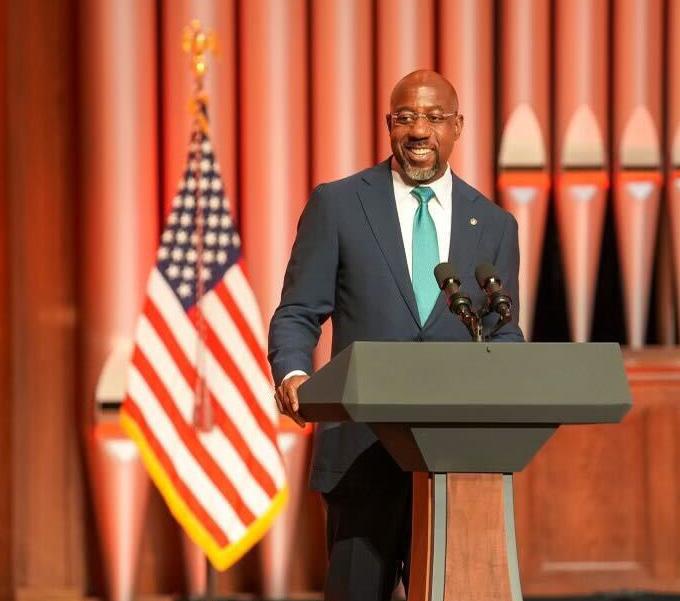
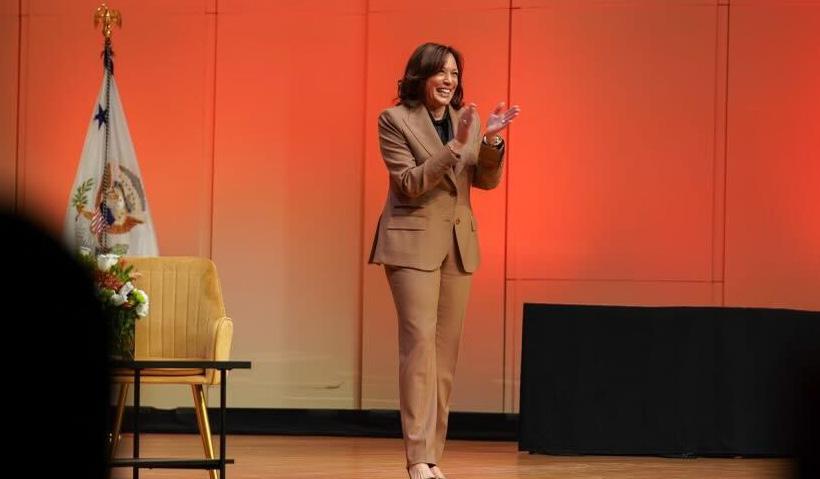
 BY DONNELL SUGGS
BY DONNELL SUGGS
Aday after Hip-Hop star Drake and his "It's All a Blur" tour filled State Farm Arena Monday night, another international superstar found her way to Atlanta for a tour stop.
The line outside of the Martin Luther King, Jr. International Capel, located on the campus of Morehouse College, stretched around the building past the school store and into an adjacent section of the campus. Hundreds of students and faculty awaited the arrival of United States Vice President Kamala Harris, who returned to Atlanta Tuesday for her "Fight for our Freedoms" tour.
Having made several visits to Atlanta's colleges and universities earlier this year, Harris made sure to spend some time in the Atlanta University Center (AUC) while on this particular tour.
Prior to Harris taking the stage, the Morehouse College marching band, "The House of Funk," performed renditions of the Tina Turner's "What's Love Got To Do With It", the Luther Vandross classic, "All My Love" and New Edition's "Mr. Telephone Man" and "Can You Stand the Rain." The latter bringing the packed chapel to its feet to sing along with the band. Both fraternities and sororities from the entire AUC also performed step routines that continued to keep the energy up as the crowd awaited Harris.
When the music stopped the sound that vibrated throughout the chapel when Harris finally came out from behind the curtains to the right of the stage was similar to a jet taking off or the demolition of the Georgia Dome some years ago. It was loud.
"Thank you to all of the young leaders that are here," she said after the applause died down. "I wanted to be here to say thank you because your generation is a special one."
"You all are not willing to sit passively by," she added.
Harris spoke of the students, ages 17-22 having had to grow up with active shooter drills, Covid safety requirements and learning by Zoom as part of their education journeys. When she asked how many were in agreement with her statement, there were un-raised hands in the massive room.
Harris' visit to Morehouse allowed her to speak to students from the other colleges that make up the AUC, including Spelman College, Clark Atlanta University, Morris Brown College and the Morehouse School of Medicine. The country's only consortium of HBCUs, the Atlanta University Center and other HBCU campuses will also become im-
portant political touchpoints heading into the 2024 presidential election.
Among the topics she and moderators Gia Peppers and Cedric Richmond discussed were gun violence and gun safety measures, climate change and climate justice, voting rights and education.
On voting Harris said to the students, "I'm here to remind you of the power of your vote" and "We can never let the powerful forces that have always tried to silence us win."
On book-banning, critical race theory and how some members of Congress are leading the way in their respective states on whitewashing slavery and its destructive impact on Black Americans, Harris, the first Black woman to hold her respective office said "Black history is American history, period. It's not a debatable point."
Harris pointed out that there was a record number of young voter turnout four years ago and there needs to be again next year.
Moments earlier Secretary of Education
Miguel Cardona, who made sure to compliment the energy in the room, threw out some statistics to the students in attendance that further solidified the need for HBCUs in this country and its graduates around the world.
on ALC52: ‘This caucus has been the tip of the spear of substantial change’Vice President Kamala Harris, a graduate of Howard University, was applauded by a crowd largely consisting of students inside the Dr. Martin Luther King, Jr. International Chapel at Morehouse College on Tuesday, September 26, 2023. Photo by Julia Beverly/The Atlanta Voice Senator Rev. Raphael Warnock, a Morehouse College graduate, back on familiar territory inside the Dr. Martin Luther King, Jr. International Chapel at Morehouse College on Tuesday, September 26, 2023. Photo by Julia Beverly/The Atlanta Voice See HARRIS on page 3
Continued from page 2
Cardona said 40% of Black engineers in the United States come from HBCUs, 50% of Black teachers come from HBCUs, 70% of Black doctors and 80% of Black judges as well. All of those respective professions are more likely to vote in not only presidential elections, but for local government, and in senatorial, congressional and gubernatorial elections.
"And 100% of Black vice presidents," he added to massive applause.
The third stop on the nationwide tour of both Historically Black Colleges and Universities and predominantly white institutions (PWIs), Harris has already visited Hampton University and North Carolina A&T University, as well as Reading Community College in Reading, Pennsylvania, earlier this month. There are plans for Harris, a graduate of Howard University, an HBCU in Washington, D.C., to visit PWIs in Arizona, Nevada and Wisconsin during October, according to a schedule on the White House website. But this visit to the heart of HBCU education in the south is always unique.
Earlier in the afternoon Morehouse College President David A. Thomas welcomed the students and guests prior to Harris taking the stage. Thomas asked the students to pay close attention to what Harris was going to tell them because they were the future voters and leaders of the community.
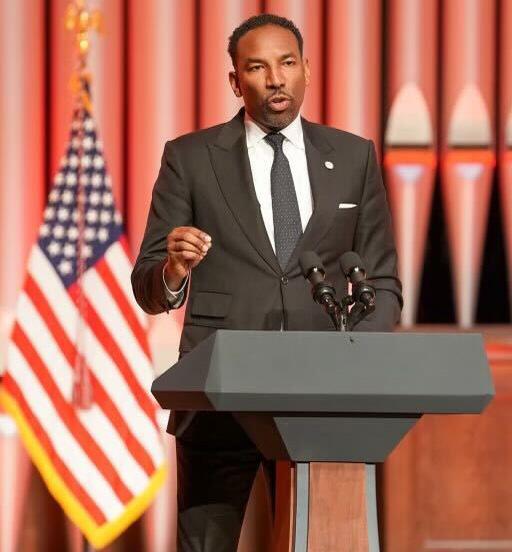
"Students, you have the power to effect
change on a local, state and national level," Thomas said.
Senator Raphael Warnock and Atlanta Mayor Andre Dickens followed Thomas and also addressed the crowd before Harris took the stage. Warnock, a Morehouse College graduate, said he was proud to be back in the AUC and that " change and progress in this country happens when young people stand up."
He added, "Don't let anyone roll our progress back."
Dickens, who has seen his popularity wane a bit among younger Atlantans due to ongoing "Cop City" protests, told the crowd that Atlanta was a "group project" and one way they can contribute to that group project is "to vote in all elections."
The student government presidents from Clark Atlanta University, Morehouse College, Morris Brown College and Spelman College took turns rallying their fellow students to vote in the upcoming local elections or register to do so.
Bria Banks, the Spelman College SGA president called Harris a trailblazer and inspiration to young people of color adding, "I am grateful to have vice president Harris in the Atlanta University Center. It is our responsibility to lead the charge of addressing these pressing issues," said Banks.
The fight for freedoms continues. "We are taught at HBCUs and in our communities that history is kind of a relay race," said Harris. "We are carrying the baton for our part of the race."
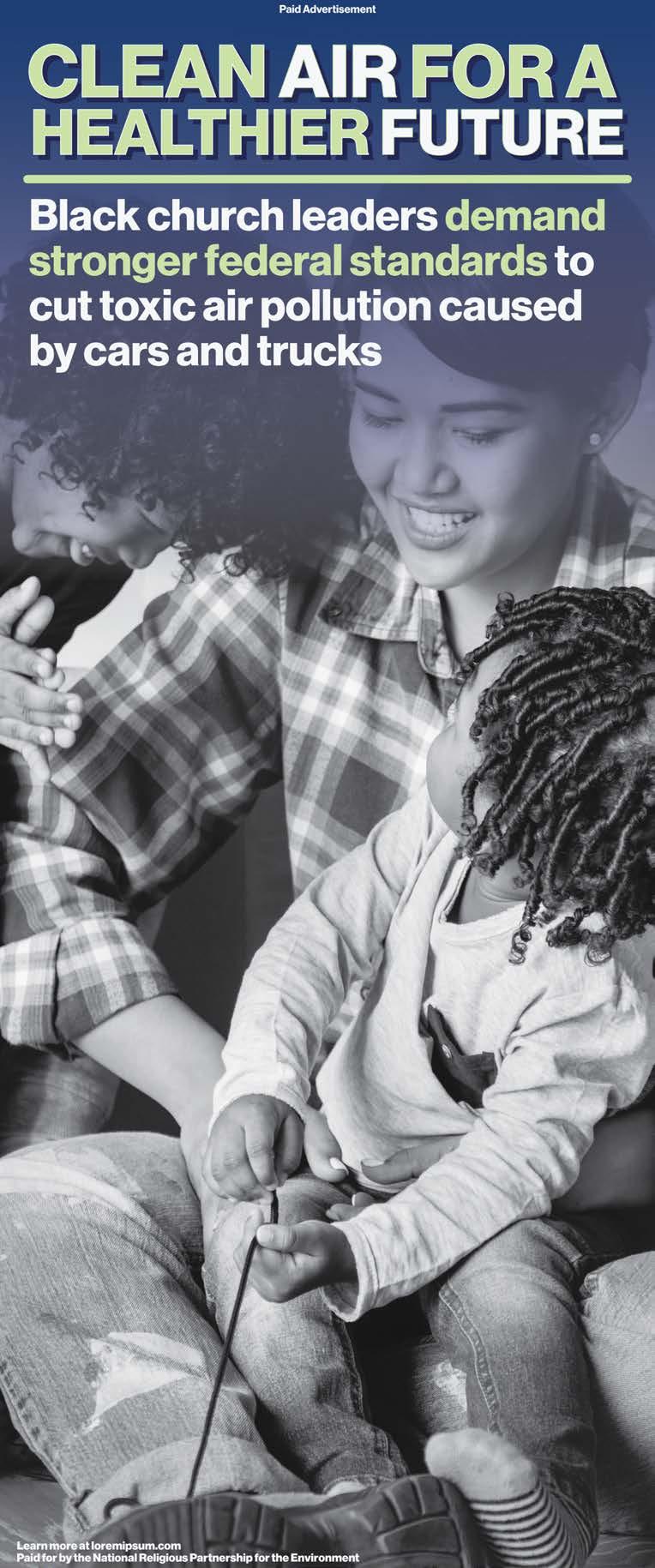
As we acknowledge the 60th anniversary of the 1963 March on Washington and the 1963 bombing of 16th Street Baptist Church, which killed four little Black girls in Birmingham, Alabama, I am reminded of the resilience of Black people.
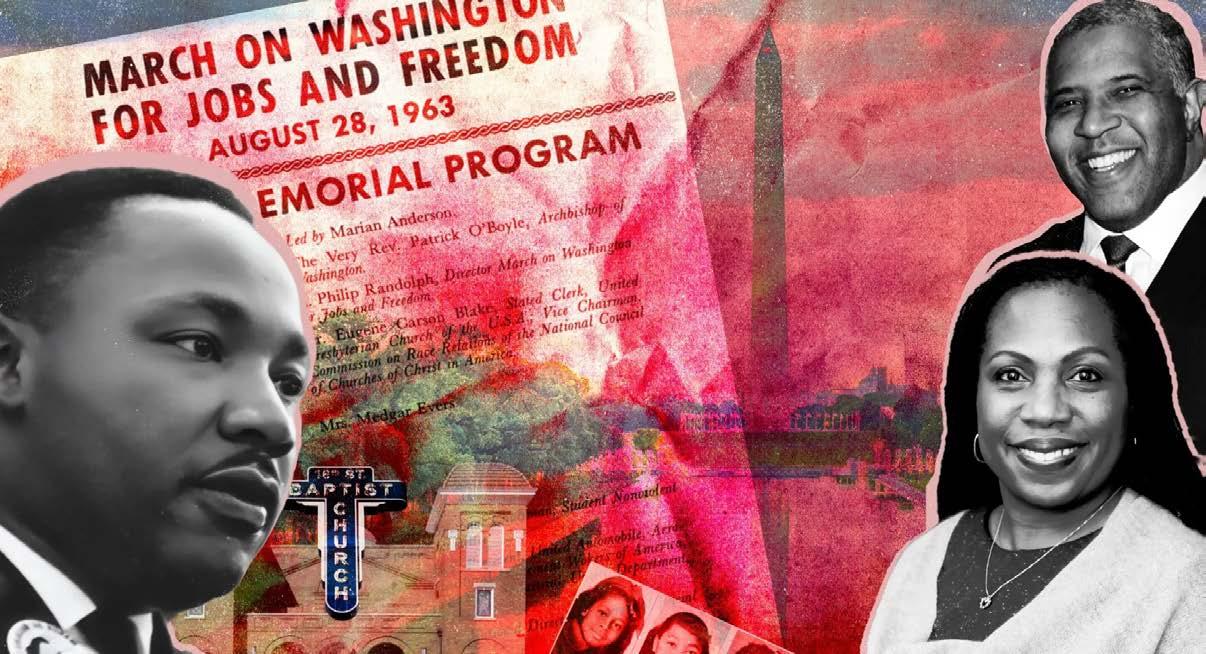
The recent speech made by Black businessman and philanthropist Robert Smith at the March on Washington and the first Black female Supreme Court Justice Ketanji Brown Jackson’s keynote comments at 16th Street Baptist speak “Truth to Power.”
Smith, the billionaire CEO of Vista Equity Partners and the richest African American, reflected on his economic justice comments in his Linkedin post and wrote, “Black Americans continue to break significant barriers in our society but still endure systemic obstacles…Despite these hindrances, Black Americans persevere, remain steadfast and work to shape the future of this country.
Yet, there remains a struggle for relevance, a sense of belonging and ownership of this nation.”
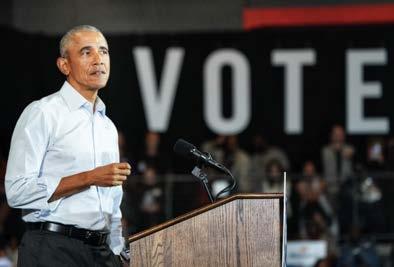
During the March on Washington observance, Smith stressed to Black America that “We are enough,” encouraging us to take it upon ourselves to “build the economic infrastructure needed to bridge the #racialwealthgap. And it is up to us to invest in #education, digital #technology and the talent pipeline to help close opportunity gaps that affect Black Americans, including the #generationalwealthgap.”
His words resonated with me as I thought of our proactive fights as Black people against slavery, lynchings, and police killings, and for voting rights, economic equity, and quality education.
We have a history of fighting the good fight, focusing on our collective strength instead of individual agendas.
We excelled with “Black Wall Street,” a thriving business district in Tulsa, Oklahoma, in the early 1900s. As Black people achieved against the odds and demonstrated their resilience, they were con-
fronted by those who envied their accomplishments and tried to erase their existence.
Here in Houston, we celebrate the accomplishments of four formerly enslaved people who, in 1872, united to purchase 10 acres of land to commemorate their freedom and named the land Emancipation Park in the historic Third Ward.
In December 1955, following Rosa Parks’ refusal to give up her bus seat to a white man, Black people in Alabama began the https://wordinblack.com/2021/12/ the-montgomery-bus-boycott-66years-ago-this-week-roused-people-across-the-nation-to-demandequal-rights/Montgomery Bus Boycott. For 381 days, they gave up their time and convenience, and walked — sometimes using other forms of transportation — facing harassment and the loss of jobs. The bus company suffered financially as the city became desperate to end the boycott.
These three incidents showcase our abilities to shape our destiny despite the odds. Our historical journey is a reflection of our re-
silience and is based in truth. A “truth” Supreme Court Justice Jackson spoke about during her recent remarks at 16th Street Baptist Church.
“The work of our time is maintaining that hard-won freedom, and to do that, we’re going to need the truth — the whole truth — about our past,” she said.
“We must teach it to our children and preserve it for theirs,” Jackson said. “Knowledge of the past is what enables us to mark our forward progress. If we’re going to continue to move forward as a nation, we can’t allow concern about discomfort to displace knowledge, truth, or history.”
When we acknowledge our past accomplishments and traumas, and embrace our present abilities and capacity, then we can shape our future and continue to show our resilience.
Never forget “We are enough” because today, we can collectively make the change we want tomorrow.
FOUNDED
May 11, 1966
FOUNDER/EDITOR
Ed Clayton Immortalis Memoria
PUBLISHER/EDITOR
J. Lowell Ware Immortalis Memoria
The Atlanta Voice honors the life of J. Lowell Ware.
PUBLISHER
Janis Ware jlware@theatlantavoice.com
PRESIDENT/ GENERAL MANAGER
James A. Washington jaws@theatlantavoice.com
EXECUTIVE ASSISTANT TO PUBLISHER
Chia Suggs csuggs@theatlantavoice.com
DIRECTOR OF PUBLIC RELATIONS
Martel Sharpe msharpe@theatlantavoice.com
EDITOR IN CHIEF
Donnell Suggs editor@theatlantavoice.com
GENERAL ASSIGNMENT REPORTER
Janelle Ward jward@theatlantavoice.com
GENERAL ASSIGNMENT REPORTER
Isaiah Singleton isingleton@theatlantavoice.com
EDITOR AT LARGE
Stan Washington swashington@theatlantavoice.com
MANAGING EDITOR, DIGITAL
Itoro Umontuen iumontuen@theatlantavoice.com
ADVERTISING, SALES & CIRCULATION
ADVERTISING ADMINISTRATOR
Chia Suggs advertising@theatlantavoice.com
CIRCULATION MANAGER
Terry Milliner SALES
R.D.W. Jackson rdwadman@gmail.com
SUBMISSIONS editor@theatlantavoice.com
CONTACT INFORMATION
633 Pryor Street, S.W. Atlanta, GA 30312
Office: 404-524-6426 info@theatlantavoice.com

“Change will not come if we wait for some other person or some other time. We are the ones we’ve been waiting for. We are the change that we seek.”
— Barack ObamaSonceria “Sonny” Messiah Jiles is CEO of the Houston Defender Network As Robert Smith and Ketanji Brown Jackson recently reflected, honoring the past and embracing the present enables Black folks to shape our future. Credit: Illustration by Demis Courquet-Lesaulnier via Wikimedia Commons/Adobe Stock
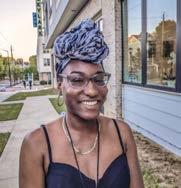
 BY JAMES A. WASHINGTON
BY JAMES A. WASHINGTON
My word for today is steward or stewardship. I haven’t found this very important word in the Bible yet, but I have heard many pastors preach on it. From the pulpit I’ve heard the question asked, “Are we good stewards of our own sexuality?” I have personally received the message of stewardship as it has related to tithing. However, I must admit that it wasn’t until I heard someone ask the Lord (in prayer) to be a good steward of His Word that the term really hit home. On many occasions I have prayed to be a worthy vessel for the Holy Spirit. Face down in prayer, I’ve asked my Lord and Savior to empty me of all of those human characteristics that would prohibit the Holy Spirit from residing in me. My thought was and continues to be that any (and I do mean any) space in my soul or my heart that could actually be good enough for a dwelling place
for Him, would in some way be an indication of my effort to live a good Christian life. It is my way of asking God for help.
I am often reminded that I’ll never be worthy of such a request but, God loves me so much that He has already given me this great and wonderful gift. It’s just very hard for me to accept it. But as you can see, I’m working on it. My point is that stewardship or being a good steward is an action. It calls for an effort. When I heard the prayer calling on the Lord to be a good steward of His Word, I immediately thought about what that would mean for me. I came to the conclusion that if one was a good steward for God’s Word, then that Word should be nurtured and cultivated for one purpose and
one purpose only; to bear fruit. I’m declaring that you cannot be a good steward of God’s Word and not bear some kind of fruit. In this case that fruit should be given in such a manner that o\thers at least recognize that you are a vendor for that fruit. Somebody should see your fruit stand. Either through your behavior, your attitude, your verbal praise, your prayers or via some other outward manifestation, the world should be able to see God’s Word operating in you.
Some say people should see Christ in you. When you are viewed by others, there should be no question as to who you are and who you are.
I’m just now more convinced than ever that stewardship is a verb. The Word cannot reside in you quietly. It
cannot be a secret only between you and God. Nor can it be selectively used when it suits you. The Word is what it is. Like water, it cannot be held back; nor should it be. Once again, I submit to you that if you are a child of God, people need to hear you say that you know who your Daddy is with pride and boldness. I believe that is what is meant by the saying ‘being a good steward.’ It demands personal recognition that we acknowledge and share the truth that is in us. It requires action; the kind that makes those around us know, without a shadow of a doubt, that we accept Christ as our Lord and Savior and God Almighty as the one true God. If those around you know that, then you are indeed a good steward in the business of bearing fruit. If no one around you knows this, then maybe you need to go shopping.
May God bless and keep you always.
“I think that the most important thing that needs to be taught in schools due to like the whitewashing that’s happening in our education system is independent thought. What my parents taught me is that it’s not just the book that gives you knowledge. It’s your experience, it’s your ability to ask questions. It’s your ability to think critically. And I think that that’s the most important thing: independent thought..”
“I feel like they should be taught more about black entrepreneurship. People like Madam C.J. Walker and also taught about hustling and Black Wall Street and how there were Black entrepreneurs and how that was destroyed. Because today a lot of Black people are becoming entrepreneurs. So I feel I think we should be talking about this, so we can show that it is possible and to keep going in spite of people trying to take that away from you because you have the right to be an entrepreneur.”
“One thing that I want our children to know, with all the whitewashing in America, so that White people don’t feel ashamed, is to really emphasize how many inventions that black people have contributed to the United States and to the world. One example, would the, the automatic gearshift, which was invented by a man of color, a Black man. I think that’s significant because it represents our ability to move forward and choose the way we want to navigate in the world with ease.”
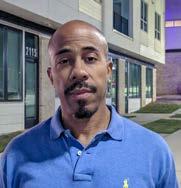
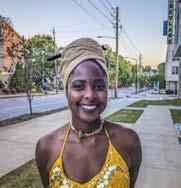
“One of the things I think should be covered in education with the whitewashing at all is the precolonial history of African Americans. Growing up, you know, and the way history is taught now, you would think that our history started as soon as we came to the shores of this country. And it really doesn’t take into consideration the illustrious history that we had for hundreds and thousands of years, you know, before getting to these shores.
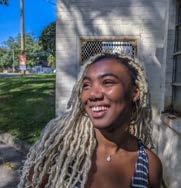
On many occasions I have prayed to be a worthy vessel for the Holy Spirit.The Atlanta Voice
“YOUR VOICE”
In this age of ‘white washing’ American history, what is the one critical lesson you think should be taught to our children?Claire Bennett Atlanta Alana Miller Atlanta Ebony Q. Atlanta Andrew Braxton Atlanta Compiled by Vincent Christie
Read full article online at www. theatlantavoice.com
Scotch Boyz, a Black-owned Jamaican sauce brand, started in 2012 from humble beginnings with four childhood friends (Drew Gray, Matthew Wallace, Neil Hudson, and Kemal Swamy) who shared a passion for cooking and a love for great food. After participating in a BBQ cook off and being overwhelmed with positive feedback, they decided to bottle their sauces.

Unfortunately, after completing high school all four friends went to separate universities. However, once a year they would reunite in Jamaica for Drew’s annual BBQ. Each year, news would spread about how amazing the food was, drawing both old and new faces seeking to get a taste. Drew had perfected a sauce that his grandfather first made in Portland, Jamaica over 60 years ago.
The brand, who received investment as a 2022 winner of the SheaMoisture Next Black Millionaire Fund, is passionate about making an impact on the communities that they work with such as support of small farmers and The Scotch Boyz Foundation (which is dedicated to providing additional support for underfunded schools in their local community).
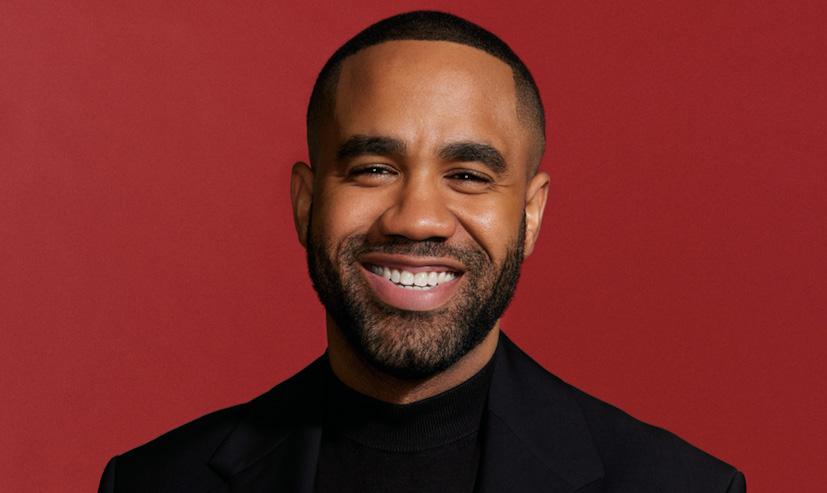
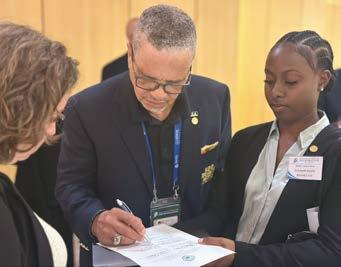
As one of the winners of the fund, Neil Hudson and Scotch Boyz received a $100,000 grant, a dedicated Target endcap in over 600 stores and online at Target.com, and a variety of business development coaches and services.
Hudson was born and raised in Westmoreland, Jamaica, but moved to Atlanta from Boston five years ago when he was offered a position to relocate to Atlanta to manage relationships and sales at companies like Cox Communications and Southern Company.
Hudson spoke with the Atlanta Voice to discuss Scotch Boyz
The Atlanta Voice: Why did you decide to start your business? Was there a moment that inspired you to start your business? Also, tell me a little bit about the creation of the business.
Neil Hudson: Scotch Boyz was born at a BBQ competition in Jamaica with my three childhood friends. After graduating from high school and going to separate universities, we didn’t see each other often, but we’d always reunite for the BBQ competition. After winning BBQ competitions, people kept on reaching out for more sauce, so we decided to start our own company. Now, Scotch Boyz brings the unique island flavors of Jamaica to you, no matter where in the world you may be.
AV: How did you all come up with the name “Scotch Boyz”?
NH: Scotch bonnet peppers are the heart of our sauce recipes and Jamaican cuisine. My friends and I, the creators of Scotch Boyz, are real yard boys (slang for a Jamaican person) who love Jamaica and nothing more than good Jamaican food. The name Scotch Boyz not only pays tribute to who we are but where we come from.
AV: Is there a mentor in your life that inspired/inspires you as a business owner?
NH: My dad owned a restaurant growing up but the most successful people I saw were entrepreneurs. There is a Jamaican Billionaire, Michael Lee Chin who paid for the exam fees for the country’s entire graduating class and he is someone that I have always looked up to.
AV: The brand recently received invest-
ment as a 2022 winner of the SheaMoisture Next Black Millionaire Fund and received a $100,000 grant, how did that make you feel and what was the money used for?
NH: I was thrilled when I got the news that I was going to be a part of the Next Black Millionaire program as I knew this would propel Scotch Boyz to the next level and it has. Getting on the shelves at a major retailer is harder than getting into Harvard and the NBA combined. The mentors I had through the Next Black Millionaire program helped make that a reality for Scotch Boyz. The Next Black Millionaire program accelerated Scotch Boyz’ growth and maturity by at least a decade. With the grant, we are able to continue proudly supporting over 200 farmers in Jamaica. With every purchase of our Scotch Boyz sauce, our proceeds go to supporting small farmers as they work to grow their businesses and contribute to their communities. By supporting small farmers, we can make a positive impact on local economies and help ensure a sustainable future for farmers and their families. This is similar to SheaMoisture and how they sustainably source their Shea butter and coconut oil providing fair wages, resources, and opportunities to more than 53,000 women in cooperatives in West Africa.
A part of the grant went to also hiring our first full time employee and that has allowed me to step outside of the business to focus on partnerships and value-added tasks to help scale the business.
AV: What are your business goals for the remainder of the year?
NH: I have an ambitious goal, ten thousand in two. I want Scotch Boyz to be available in 10,000 doors in the next two years. The first step is to expand in all Targets and I’m hopeful that based on the strong sales I had with the Next Black Millionaire end cap that this will be a reality.
AV: What type of advice do you have for future business owners about taking the plunge?
NH: It is always okay to ask for help with your business and goals. Owning a business can be a lot of work and it is important to have a strong community you can rely on to help carry the load. Thankfully through the Next Black Millionaire program, SheaMoisture has helped Scotch Boyz expand in ways I didn’t think were even imaginable! Also, do your research, identify who you will need to make your business successful and find ways to partner with them.
For more information and to purchase, visit https://www.scotchboyz.com.






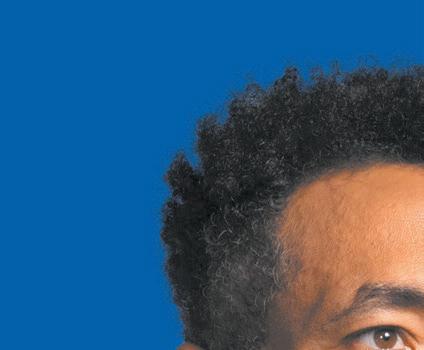


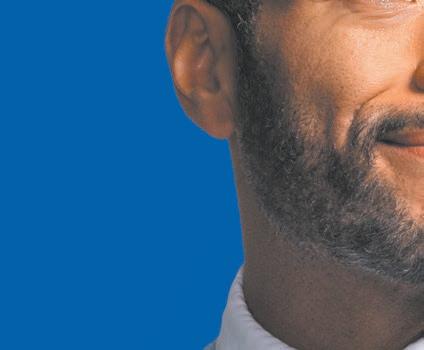


WASHINGTON, D.C. - The first Black senator in the history of Georgia and the first Black female attorney general in the history of New York State were among many thought leaders, professors, politicians and activists that took part in the annual town hall meeting during day two of the Annual Legislative Conference.
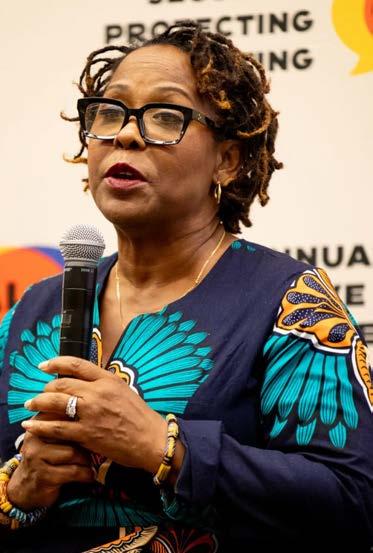

Along with Georgia Senator Raphael Warnock and Attorney General of New York Letitia James, two of the more high profile Democrats in the news these days, civil rights advocate and scholar Kimberle' Crenshaw, Black Economic Alliance CEO Samantha Tweedy, Congressman Steve Horsford (NV-04), Fearless Fund CEO Ayanna Parsons and Damon Hewitt, president and executive director of the Lawyers' Committee for Civil Rights Under Law participated in a panel on race and racial equity.
Warnock called this year's Annual Legislative Conference, a "family reunion" and "a call to action fortified by thought-provoking discussion."
James, a native of Brooklyn, will be in civil court in New York next month with former President of the United States Donald J. Trump, and spoke about the disinformation and attempts to erase Black history. "We must not only push back against this racist and malicious assault on our citizenship, we must stomp it out all together."
The topics of discussion for the first panel and the second on threats to Black American democracy were moderated by Dr. Michael Eric Dyson. The author and public speaker made a number of Hip-Hop references throughout the two and a half hour town hall.
"We are living in the midst of a crisis," he said.
Parsons also took a few moments to talk about the need to continue building wealth within the Black communities of this country. The Fearless Fund, which is based in Atlanta and has invested millions in Black female owned businesses, was recently sued by Edward Blum. Parsons said there are three things that make the world go round: money, power and love."
"We as Black people have a whole lot of love. What we don't have is a lot of power, and we don't have enough money," she said.
Tweedy used a bit of data to make a point
of how wide the wealth building gap is in this country. Tweedy said the average salary of a Black college graduate is on par with the average white high school dropout. Similar data can be backed up by research that was done by the Urban Institute.
The following panel on threats to democracy featured Black Voters Matter co-founder Lastosha Brown and Tennessee state representative Justin Brown. Both spoke of keeping up the fight for equal rights and representation, both in the communities and within lawmaking spaces.
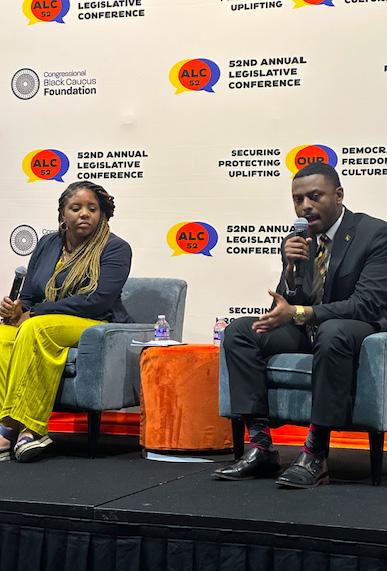
"A new south is rising that's multiracial and multi-generational," said Jones.
Brown, who took several opportunities to sing in between speaking about the importance of voting, said, "We can't keep responding to what they want. I don't care what they want.
Later that afternoon a panel on the futures of Black farming took place. "Harvesting Change: Building a fair future for Black Farmers' ' was hosted by Black-owned whiskey brand Uncle Nearest Premium Whiskey, the National Black Growers Council and Farm Credit Mid-America, a Ken-
tucky-based financial services company for farmers. Representatives from all three companies took the stage alongside Congresswoman Shontel Brown, who moderated the panel. Brown represents Ohio's 11th Congressional District and had a number of constituents in the crowd.
Keith Weaver, co-founder of Uncle Nearest Premium Whiskey, has a distillery and farm in Shelbyville, Tennessee and spoke on the power of farming as a business model.
"There's a viable business opportunity in farming," Weaver said, who admitted that his farm uses 350,000 bushels of corn (or 20 million pounds) of corn per year. Farming is crucial to what his national whiskey brand does.
"There's a misconception of agriculture," Farm Credit Mid-America Emerging Market Business Development Manager Marcus Tyler said.
Christi Bland, a fourth-generation farmer from Sledge, Mississippi, is a board member of the National Black Grower's Council (NBGC) and listed access to capital and access to land as issues new farmers have to face.
She shared some data the NBGC uses to make their point about the need for Black farmers to get started early. The average age of Black farmers is 57, six years older than non-Black farmers in this country, said Bland, who's family farm is 1,600 acres.
"Black ownership matters," said Weaver. "Without ownership they can get erased, they can get forgotten."
Fisk University gymnast Morgan Price explained how she made the decision to not be the only Black woman on her team for the first time in her career. A five-star recruit while growing up in Dallas, Texas, Price earned a full athletic scholarship to the University of Arkansas when she decided to become a part of the first Historically Black College and University (HBCU) gymnastics program in the country earlier this year.
"Growing up I never had a Black coach and I didn't understand the meaning of that until I got to Fisk," Price said. "Every time we go to practice or go out on the weekend or prepare for a competition we help each other with our hair, nails and lashes."
Arkansas plays in one of the top gymnastics conferences in the country, the Southeastern Conference (SEC). Fisk doesn't have
a gymnastics gym on campus and has to bus its gymnasts to a local gym to practice and get treatment. Knowing all of this, Price made her decision and hasn't looked back, she says.
"There was no option for me to go to college and not do gymnastics," Price said. "It was a very big sacrifice."
A panel on the intersection and necessity for public policy solutions for Black women and girls in gymnastics, "Beyond the Beam: Exploring public policy solutions for Black women and girls in gymnastics" took place on day three of the Annual Legislative Conference Friday morning.
Price joined Rutgers University women’s gymnastics head coach Umme Salim-Beasley, Wendy Hilliard, a USA Gymnastics Hall of Famer, USA Gymnastics Board member Lois Elizabeth Bingham and Congresswoman Emilia Strong Sykes (D-OH)
The
Continued from page 8
gan their personal gymnastics journeys. All but Bingham had been gymnasts, including Maxwell and Strong Sykes. All of the former gymnasts, coaches and student-athletes on the panel were either the only Black girls on their team and/or never had a Black coach during their career.
Only 10% of Division I scholarship athletes involved in gymnastics are Black.
"It was my very first sport and it is my favorite sport," said Maxwell, a political analyst. Salim-Beasley, a collegiate head coach for over a decade, said seeing the late Di-
anne Durham, the first Black woman to win an all-around senior title at the U.S. National Championships, on television changed her life.
"Seeing her really sparked and interested me in the sport of gymnastics," Salim-Beasley said. Salim-Beasley, who was part of the team at West Virginia University, is a former teammate of legendary gymnast Dominique Dawes. The pair grew up involved in the sport in Silver Spring.
Hillard, who remains involved in the sport as a coach in her native Detroit, Michigan, saw one of her former athletes in the crowd. "We have to make sure we have policy that supports Black women and girls,"
she said.
As an early trailblazer in the sport on the national level, Hillard told stories of facing racism in the sport, even from her coaches. She said she was told that she "stood out" amongst the otherwise white team.
"It made me an advocate, but gymnastics is still not diverse on the grassroots level," Hilliard said.
Congresswoman Strong Sykes said what she learned as a young gymnast has helped her do what she does for her native Ohioans in Congress today. "You do learn a lot of skills that you take with you that you can transfer," Strong Sykes said, while sharing a story of filming a campaign commercial in
a gymnastics gym. "People don't see a lot of us in the sport," she said.
Though policy may have been in the panel title, the discussion was more about what took place in the lives of these Black women and their families and what needs to continue to happen in order to keep Black girls and women in the sport.
Words like "fit", "presence", and "look" came up a lot during the conversation.
All of the panelists agreed that there have been major advances in the sport for Black women but there is still a lot of work to do. "There's still a problem to be solved," Bingham said. "Being able to be at the table talking about this is very important."
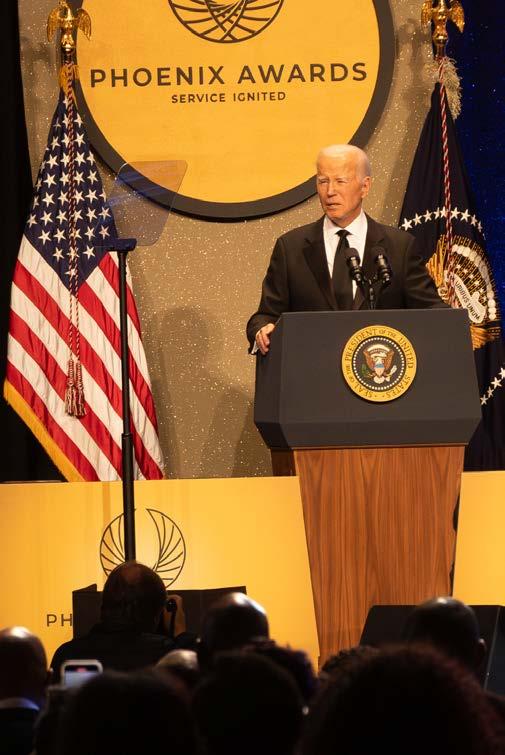
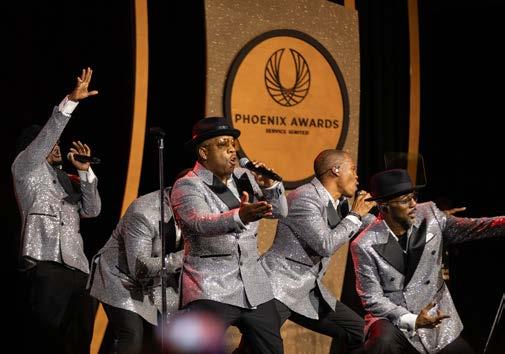
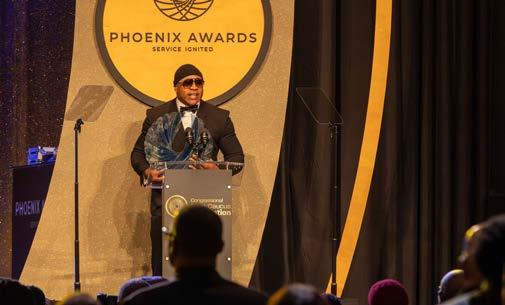
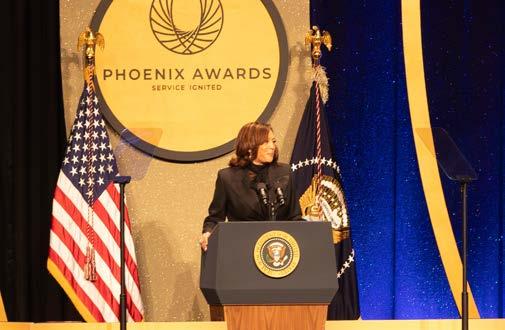

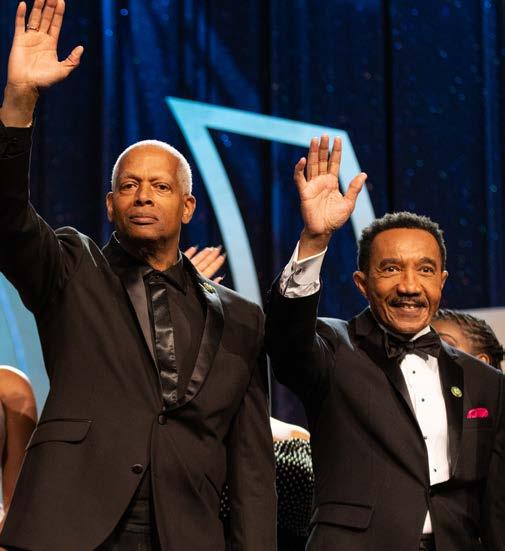
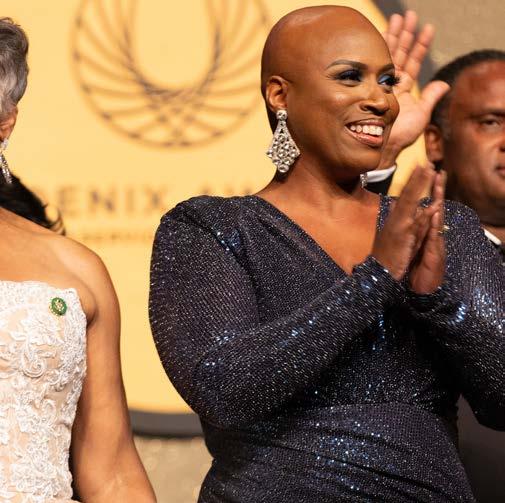
WASHINGTON, D.C. —
Ayana K. Parsons, Chief Operating Officer of the Fearless Fund, began her comments inside the opening town hall at the Congressional Black Caucus’s 52nd Annual Legislative Conference by making one simple declaration:
“So let me just start by saying that there are three things that make this world go round: Money, power, and love. And we, as Black folks, we got a whole lot of love. But I will tell you what we don’t have: we don’t have enough power and we damn sure don’t have enough money.”
The Fearless Fund is a venture capital firm founded by women of color investing in women of color-led businesses seeking preseed, seed level or series A financing. Their mission is to bridge the gap in venture capital funding for women of color founders building scalable, growth aggressive companies. Along with her partner Arian Simone, President and Chief Executive Officer of Fearless Fund, they have been seeking to shift the levels by which women of color led companies receive the requisite investments needed to compete in the American economy and invest in their respective communities.
If Black women-owned businesses matched the average revenue of those led by white women, $667 billion would be added to the U.S. economy, and if Black women-owned businesses matched those led by men, $7.9 trillion would be added.
In 2022, more than $208 billion was deployed to entrepreneurs to start businesses. That is venture capital that seed money to start those businesses. Of that $208 billion, 0.39% of those dollars went to women of color, according to Parsons.
There is no debate that the Fearless Fund is needed and their efforts are noble. However, America’s right wing is equally determined to maintain the current status quo.
Edward J. Blum, the brains behind lawsuits that ultimately saw Affirmative Action get struck down by the United States Supreme Court, has targeted Parsons and Simone. On August 2nd, the conservative activist filed a suit against the Fearless Fund. In the suit, Blum’s non-profit, the American Alliance for Equal Rights, claims the Fearless Funs is violating Section 1981 of the Civil Rights Act of 1866, a U.S. law that forbids racial bias in private contracts, by making only Black women eligible in a grant competition. It was filed in federal court in Atlanta.
Blum’s lawsuit focuses on Fearless Fund’s Fearless Strivers Grant Contest. It’s a competition that awards Black women who own small businesses $20,000 in grants and digital tools to help them grow their businesses and mentorship opportunities provided by a partnership with Mastercard.
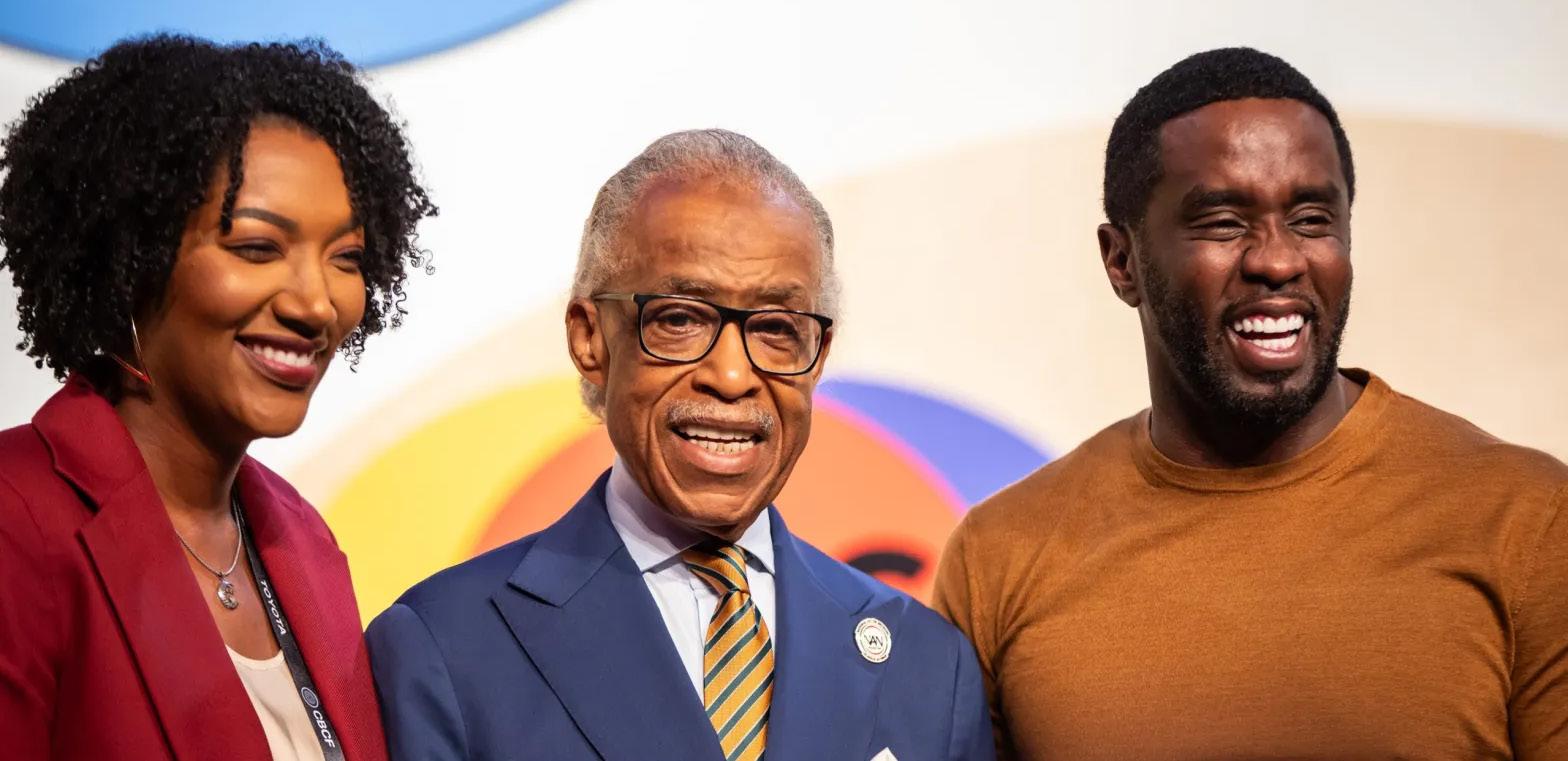
The ramifications are wide-ranging in either direction.
Thirteen Republican state attorneys general have sent letters to CEOs of FORTUNE 100 companies declaring their stances regarding diversity, equity and inclusion (DEI) are un-
constitutional if the Supreme Court’s ruling was applied.
“Treating people differently because of the color of their skin, even for benign purposes, is unlawful and wrong,” they wrote.
They also argued DEI programs are a modern form of discrimination.
Meanwhile, supporters on the side of the Fearless Fund believe this is not solely a Black or Brown versus white issue because the reality is that Parsons and Simone do have white allies on their side that are fighting alongside them. The law firm Gibson, Dunn and Crutcher has been enlisted to mount the defense of the Fearless Fund. Additionally, the Benjamin Crump, the National Women’s Law Center and the NAACP Legal Defense Fund are providing services to the Fearless Fund.
“This isn’t about money,” explained Parsons. “This is about wealth creation. This is about the American dream, and quite frankly, Edward Blum, who has sued the Fearless Fund, is trying to dismantle our economic freedom and our ability to pull ourselves up by our bootstraps, and experience that which is the American dream. So this is so much bigger than us.”
According to a study conducted by Pew Research, majority Black American-owned businesses made up the greatest share of all classifiable firms in the District of Columbia, Georgia and Maryland. Additionally, Nearly six-in-ten Black adults (58%) say supporting Black businesses, or “buying Black,” is an extremely or very effective strategy for moving Black people toward equality in the United
States.
“80% of white Americans have networks that are 100% White,” explained Parsons. “If you are Black and Brown, you are eight, nine, even ten times more likely to have completely diverse networks of all races, all ethnicities. That’s why this is so important because if you can diversify the investors and those who are writing checks, you can diversify the investments so we can create economic freedom and progress for all.”
The Fearless Fund did not choose Atlanta by accident. Parsons and Simone are standing on the history that was made by former Atlanta Mayor Maynard Holbrook Jackson when he established the country’s first Minority Participation Program in 1974. Out of that program, the H.J. Russell Company, The Gourmet Companies and many others became prosperous, influential, and set the economic course for the City of Atlanta and for the next sixty years as the middle class expanded and Black entrepreneurship would not only be encouraged, but celebrated.
They dared to be different and they are taking a stand for it.
“So that, my friends, is why this lawsuit is so incredibly important,” said Parsons. “He has already taken away Affirmative Action in higher education; he has already gone after board diversity Legislation in California. He is coming after us. He’s suing West Point, now he’s suing the law firms. He’s going after the corporations and their D.E.I. initiatives. So this is a very targeted and planned attack and the time for us to fight back is now.”
 BY NOAH WASHINGTON
BY NOAH WASHINGTON
SEOUL, South Korea - HWPL’s World Peace Summit had a particular local focus when the Atlanta Conflict Resolution Roundtable discussion took place earlier this week. The roundtable discussion was hosted by the International Law Department of HWPL which is located in Georgia. The discussion was moderated by General Director of International Law of the HWPL Atlanta branch, Elizabeth Doyne. Participants gathered to explore the multifaceted aspects of conflict resolution and the promotion of peace in the state, primarily through peace education and the role of the media.
The roundtable discussion invited several representatives from the Atlanta and metro Atlanta areas to take part in the discussion, including Victoria X. Vasquez, General director of HWPL peace education, Dr. Roger Harris, former superintendent of Dekalb County Schools and current co-chair of the education committee for the Dekalb County Chapter of 100 Black Men, Phillip G. Finch, former board member of the education committee in the Dekalb County chapter of 100 Black Men and Shuna Malcolm, founder of "Enough is Enough," a youth program aimed at ending gun violence among youth.
Each participant brought a unique perspective to the discussion with different prompts to help guide the session, demonstrating the diverse ways in which individuals can contribute to peacebuilding efforts with their own shared goals and strategies. Harris cited his own personal experience as an educator and former Vietnam War veteran in his quest for peace in his own community.
“As a young man, I was a soldier, I was a marine in the Vietnam War, and experienced the atrocities of war, “ Harris said. “While I was there, I made a promise that if I lived, I would dedicate my life to working with children so they wouldn't have to experience what I did. I spent 42 years after coming back from the war in education.”
Harris cited violence prevention in schools and communities and his desire to influence policy changes that could positively impact the public school curriculum.
“For me, I was losing many, many students from gun violence. What I realized is that, just like soldiers adapt to war and see the atrocities of war, it becomes so commonplace that you think that the abnormal is normal,” said Harris.
A study done by the National Child Traumatic Stress Network cites that more than 80% of inner-city youth report experiencing
one or more traumatic events. And 1 out of 10 children under the age of 6 living in a major U.S. city reports witnessing a shooting or stabbing.
“What I witnessed was that students are doing the same thing in neighborhoods. In fact, one particular gang member and his boys told me after they had killed a nine-year-old and an 11-year-old when I confronted them, that their explanation as to why they were warring with this other gang. They said, ‘this is the ghetto. This is what we do,’” Harris continued.
Shuna Malcolm expressed her dedication to ending gun violence among youth and her collaboration with the Atlanta Public School system, emphasizing the need for education on gun safety and emotional intelligence.

“One way to disrupt the peace in our community is not only by physical trauma but by emotional trauma as well, which can cause fear and anxiety inside our youth, making them afraid to go to school or even venture outside of the home,” said Malcolm. “It can also disrupt their daily lives, challenging them. It can make it seem like violence is an everyday norm.”
The participants of the discussion emphasized the urgent need for policy changes related to gun control and the prevention of violence, underscoring the importance of both behavioral and policy approaches to address the issue effectively.
“It can also take away their hope, which is very important, which can lead to children not being able to envision a better future for themselves and can have a profound impact on their mental health, leading to mental
conditions such as PTSD and depression,” Malcolm continued.
The collective group summarized that the way forward is through educators teaching peace education and conflict resolution in the everyday curriculum.
A 2022 UNESCO study reveals that 80% of respondents in the global survey believe it is their responsibility to ensure that students feel safe.
"If you're discussing the incorporation of peace education as a distinct discipline within public schools, similar to subjects like English and math, they have their own curriculum or can be seamlessly integrated into the existing curriculum," Harris said.
But, in the pursuit of advancing peace education, Finch underscored the pivotal role of data and evidence in order to get local and state politicians involved. Stating that starting with data and facts serves as a compelling foundation for initiating change at various levels. For instance, Finch cited that providing statistics revealing the alarming frequency of shootings among young people between ages 10 and 18 would provide a stark reality that cannot be ignored.
Finch also highlighted the importance of evidence-based impact assessment, citing the work of advocates who measure the effectiveness of their initiatives in reducing violence. Data and statistics, according to Finch, possess the power to persuade government officials to allocate resources for peace education, as these concrete figures provide a common ground for discussion and transcend emotional appeals.
“You've got to have those kinds of statistics. Statistics that you can present to a govern ment official and say, ‘This is what's happen ing in our community,’ “ said Finch.
Pray and Peace: Faith leaders discuss efforts to find peace among their flocks
HWPL chairman Lee Man Hee remembers with vivid precision the time he prayed on the battlefield.
"I can see the cannons coming from the enemy side. I can see them coming from our side," HWPL chairman Lee Man Hee said while recounting his experience during the Korean War.
This was the life-altering moment Hee realized that his mission was to bring peace to the world. Hee spoke about this experience during the 6th Annual Religions Leader’s conference during the 2023 World Peace Summit.
Dedicated to creating dialogue between various faiths and religions, including Islam, Catholicism, and Hinduism, various religious leaders took to the podium to discuss their ongoing faith-based conflicts and their appreciation for HWPL. This included Iman Ibrahima Doumbia, who spoke about his appreciation for HWPL’s The World Alliance of Religions’ Peace (WARP) office, which was established as a platform for interfaith reconciliation and was featured with an announcement.
The office also offers testament breakdowns so that religious leaders, as well as other interested parties, can better understand different faiths with the idea that misunderstanding leads to religious-based conflict. Doumbia even cited that knowledge is the opposite of ignorance.
"I choose to do my part by having other religious leaders attend my faith-based occasions," Doumbia said.
Another highlight of the summit was the 9th anniversary of the reconciliation of faith taking place in Mindanao, an island in the Philippines. The island had been the scene of an ongoing war for the previous 40 years as a result of the conflict between the Catholic population of Mindanao and the island’s Islamic inhabitants. The conflict ended on January 24, 2014, after a civilian agreement was signed by the Philippine government and Moro groups. The negotiations were hosted by HWPL and organized by the IWPG and the IPYG.
"These ongoing dialogue meetings are opening the global doors for solidarity," said The Most Rev. Antonio J. Ledesma, the current chairman of the Episcopal Commission of Interreligious Dialogue.
The Metropolitan Atlanta Rapid Transit Authority (MARTA) partnered with local non-profit organizations at seven rail stations for National Voter Registration Day.
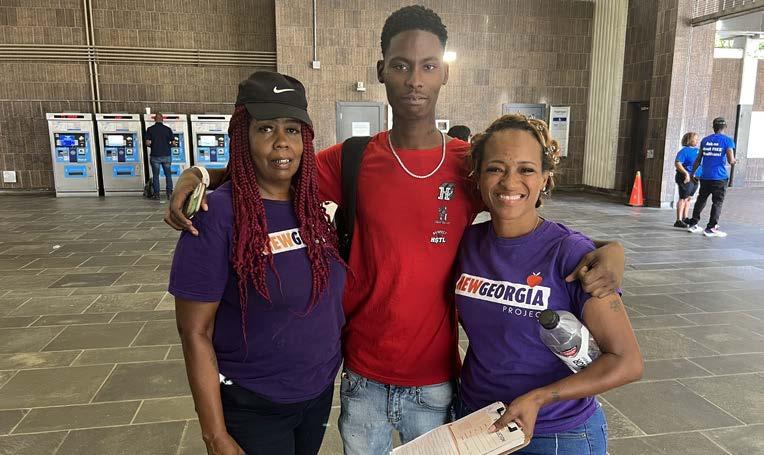
Non- partisan voter registration activities were held from 2 p.m. until 6 p.m. at Five Points, College Park, H.E. Holmes, Lindbergh Center, Doraville, Kensington, and North Springs stations.
National Voter Registration Day is the nation’s largest non-partisan civic holiday dedicated to helping eligible citizens register to vote. For 14 years, MARTA has joined community partners to expand civic engagement opportunities and encourage voter registration and election participation.
Attendees at the designated MARTA stations registered to vote by presenting their state identification card or state- issued driver’s license and provided the last four digits of their Social Security number.
The Atlanta Voice went to the H.E. Holmes MARTA station to check out non-partisan
voter registration activities. At the station, two members of New Georgia Project Ghanda Davis and Michelle Morrison were catching
people off the train and buses to ask if they were registered to vote.
“Today is National Voters Registration Day,
so we’re hitting the whole state of Georgia to get people to register to vote or updating their addresses if that has changed. This is important because you’re getting your voice heard, getting people you want to see in office and in our community whether its smaller con nections or as big as the President,” Morrison said.
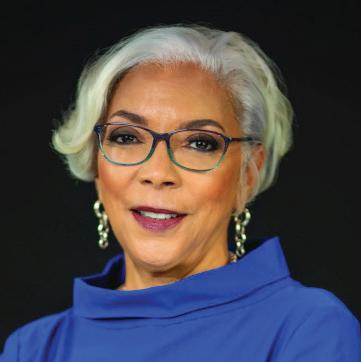
The New Georgia Project is a nonparti san effort to register, civically engage, and build power with the New Georgia Majority–the large and growing population of Black, brown, young, and other historically marginalized voters in the peach state.
New Georgia Project (NGP) staff and volunteers also hit the streets to help Georgians register to vote in communities across the state—including in Albany, Athens, Atlanta, Augusta, Brunswick, Columbus, Macon, and Savannah. NGP teams plan to meet potential voters where they are, from rec centers and libraries to high schools and college campuses from 10 a.m. to 5 p.m. To register online, visit https://sos.ga.gov/corporations-division-georgia-secretary-states-office
Atlanta Streets Alive will make its return to Midtown later this year, following a three-year hiatus primarily induced by the pandemic.
Previously hosted each year by Propel ATL since its inception in 2010, the event closes a portion of city streets to automated vehicles, giving cyclists and pedestrians full control of the commerce-heavy strip for four hours on pre-selected weekends.
The Atlanta Department of Transportation will host Atlanta Streets Alive along Peachtree Street for the first time since taking over the program this year, in partnership with Propel ATL.
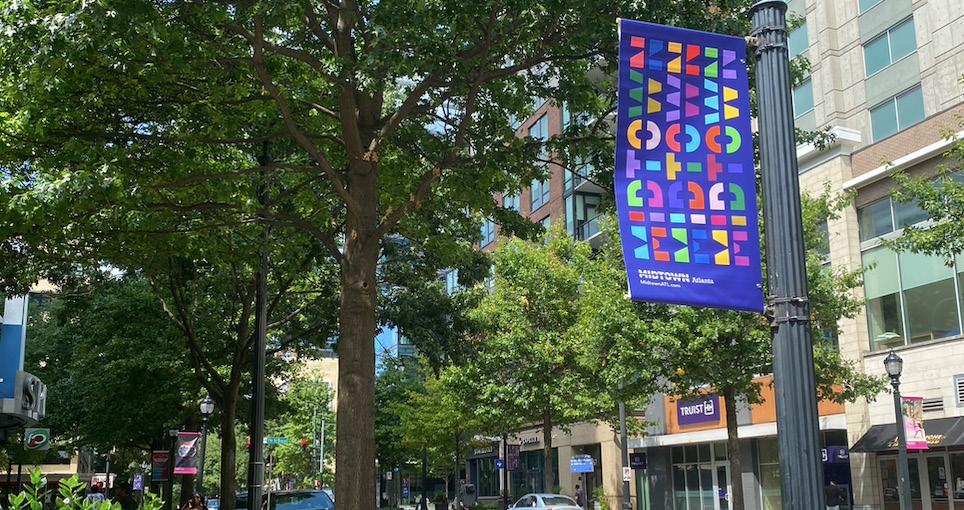
Betty Smoot-Madison, mobility director for the Atlanta Department of Transportation, said during a virtual information session about the event last month that relaunching Atlanta Streets Alive will benefit the residents who participate, as well as the business owners whose establishments line and surround the Peachtree Street route.
“This is an exciting opportunity to really create true streets for people and bring vibrancy and excitement back to our downtown core and support the local economy,” Smoot-Madison said. “As we know, people walking and biking are more likely to stop
into local shops and restaurants, either planned or unplanned, so it really is a great opportunity to bring life back to our streets.”
An ordinance was introduced to the Atlanta City Council in early 2022 that, if approved, would allow Peachtree Street to host Atlanta Streets Alive by temporarily closing for one afternoon monthly beginning in 2023. The council then voted months later to allocate funding to the program within its 2023 fiscal year budget.
Romy Maloon, lead for Atlanta Streets
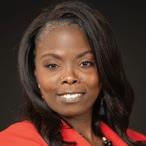
Alive at the Atlanta DOT, said the city aims to systematize the initiative into a monthly event by the end of the program’s 2024 cycle, classifying and budgeting it as “regular city business,” while generating a community-oriented atmosphere similar to that seen on the BeltLine.
Maloon also said that the closed section of Peachtree Street will serve as the only pedestrian route for the first installment of Atlanta Streets Alive, but organizers may explore additional routes in other parts of town in the future, depending on the program’s success.
“Our hope is that this is such a successful program that we can create this structured roadmap of how to do it and bring that to other neighborhoods in the upcoming years,” Maloon said.
According to Propel ATL and the DOT, the
stretch of Peachtree Street spanning from 14th to Mitchell streets will be closed to vehicles from noon until 7 p.m. on each day of the event. MARTA buses that normally travel Peachtree Street will follow alternate routes during the posted hours. Select intersections will remain open for traffic to cross during hours of closure.
Atlanta Streets Alive is scheduled for the following Sundays from this fall until the end of 2024:
September 24, 2023
October 22, 2023
November 19, 2023
April 21, 2024
May 19, 2024
June 16, 2024
July 21,
August 18,
September 15,
October 20,
November 17,
Read full article online at www. theatlantavoice.com
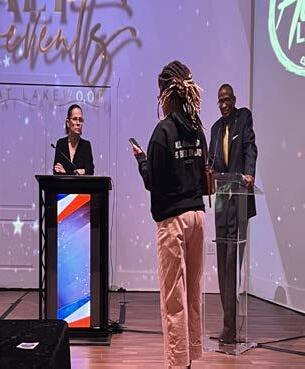 BY ISAIAH SINGLETON
BY ISAIAH SINGLETON
Equity in Education (EiE), in partnership with ALi at Lakewood, hosted the first School Board Candidate Debate of this election season Wednesday evening.
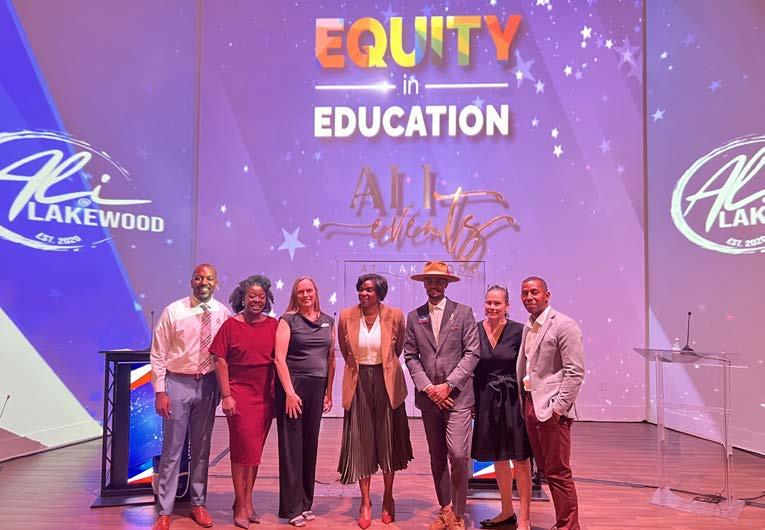
Four Atlanta school board members faced off against challengers and gave voters the opportunity to learn more about the candidates and ask questions that matter to them most.
TV and Radio Personality Rashad Richey served as moderator of the debate, followed by a Q&A from community members. Nearly all candidates were at the debate, including at-large candidates Alfred “Shivy” Brooks, Tamara Jones, Nkoyo Lewis and Jessica Johnson (District 1 incumbent Katie Howard is running unopposed and William “Will” Sardinia, an at-large District 7 candidate, did not attend the debate.)
Debate Synopsis
During the event, the debate focused on establishing equity across the board, student achievement, and the board’s recent decision not to extend former Superintendent Lisa Herring’s contract.
The three main talking points for the debate were board transparency, literacy, and the budget.
During the debate, a few candidates questioned the courage of incumbents on board votes and at-large District 9 incumbent Jessica Johnson said the board has done a good job of keeping the community informed.
Johnson’s opponent, Nkoyo Effiong Lewis said she would love to see the board operate “with the courage of their convictions and to share what their decisions are on matters where they are or are not necessarily unanimous.”
Also, at-large District 7 candidate Alfred “Shivy” Brooks said the current board has a “courage deficit”.
“When our board members decide to vote unanimously, essentially, they are hiding their intentions. We need people courageous enough to tell you exactly how they feel about something,” he said.
His challenger, at-large District 7 incumbent Tamara Jones said the board could do a better job communicating its process.
“I want to make that much more clear to the public and how the board actually operates and people don’t think we’re just going off and making decisions in a vacuum,” she said.
Furthermore, 56.5% of Atlanta’s third graders are reading at or above grade level, accord-
ing to a study by the Georgia Department of Education.
Ken Zeff, executive director of the education nonprofit Learn4Life said Atlanta Public Schools (APS) should develop a comprehensive literacy plan.
“We should train the teachers, train the instructional coaches, train the assistant principals, train the bus drivers, so that everyone understands that we’re passing a comprehensive science-based instructional strategy for literacy,” he said.
Learn4Life works with metro Atlanta school districts to improve outcomes and he also has been an interim superintendent of Fulton County Schools.
His opponent, District 3 incumbent Michelle Olympiadis said the district should consider implementing Orion-Gillingham, a program often used to teach students with dyslexia at all schools.
Olympiadis said when she was working at Morningside Elementary School at the PTA, they implemented this program which showed improvement “not just for kids who needed the program, but even for the kids who are doing great.”
Additionally, the District 5 candidates argued who was more qualified to provide additional insight on the district’s $1.6 billion budget.
During the community Q&A, community

members brought up questions regarding Atlanta Public School properties, board meeting awareness, produce when it comes to student lunches, resources, and more.
High School student Morgan Barnette told candidates she noticed people don’t know about the meetings and debates.
“I don’t think anybody other than the people in this room knew about this meeting for real. I feel like people should know about these meetings,” she said. I didn’t even know what this was and we don’t even know who is on the board, they don’t come to our schools or talk to us other than parents, and although that’s great, we are the ones sitting in these classrooms.”
The Atlanta school board race is the only election on the ballot this fall. Early voting is scheduled from Oct. 16 through Nov. 3. Election day is Nov. 7. Runoff elections for any seats, if necessary, will happen in December.
The 2023 Atlanta School Board candidates:
Maynard Jackson Cluster, District 1
Katie Howard, who is running unopposed, was first elected in 2021.
District 3: Midtown Cluster
Michelle Olympiadis (I) has served on the school board since 2017. She is also a board member for the Georgia School Boards Association.
Her challenger, Ken Zeff, is the executive director of local education nonprofit Learn4Life. He served as Fulton County’s interim school superintendent for the 2015-16 school year.
District 5: Mays Cluster
Incumbent: Erika Mitchell was first elected in 2017. She’s the vice president of business development for ChanceLight Education, which contracts with public school districts and other educational institutions to provide special education programs.
Mitchell’s opponent, Raynard Johnson, is a digital media and IT consultant. He lost bids for an APS board seat in 2017 and 2021.
District 7: At Large
Tamara Jones (I) has worked in architecture and urban planning for over 25 years, according to her campaign bio. She was elected to the board in 2021.
Alfred “Shivy” Brooks, teaches economics, personal finance and government at Charles Drew High School for Clayton County Public Schools. Brooks unsuccessfully ran for Post 1 at Large on the Atlanta City Council in 2021. William “Will” Sardin is also challenging Jones.
District 9: At Large
Jessica Johnson was appointed to the school board in January 2023 to fill former board member Jason Esteves’ seat. Esteves resigned because he was elected to the Georgia Senate.
Nkoyo Effiong Lewis is an education advocacy attorney
directs the Law Practice Management program at the State Bar of Georgia.
TikTok was built off of Black creators. Black employees say they faced discrimination
Morgan Bolton packed what she could and started heading to her car. She took another look at the email that she was sent about her school, The Art Institute of Atlanta, closing for good, and could not believe this was happening.
The Jonesboro High School graduate and Clayton County native came to The Art Institute to study fashion design and now she has to find a new school.
“I’m going to do the whole process all over again,” said Bolton, 23. “It feels like I’m in high school again. I can’t start school again till the start of a new semester.”
Bolton told The Atlanta Voice that she has plans to start looking at schools this week.
“Once I finish here I’ll start dealing with that.”
The Art Institute of Atlanta sent notices to its students that the school will permanently close at the end of the month. This closure also includes Art Institute locations in Austin, Dallas, Houston, Miami, San Antonio, Tampa and Virginia.
The impact of closing a school in the midst of a semester can be devastating to students, both first-time college students like Bolton, and adult students like Lanecia Joyce.
A former United States Air Force veteran, Joyce was also packing her bags and some boxes outside of the school on Peachtree-Dunwoody Rd. Monday morning. She decided to go to college after her military service, with the express goal of becoming a
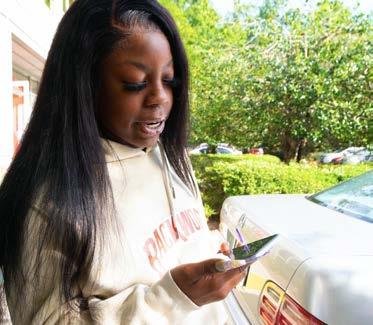
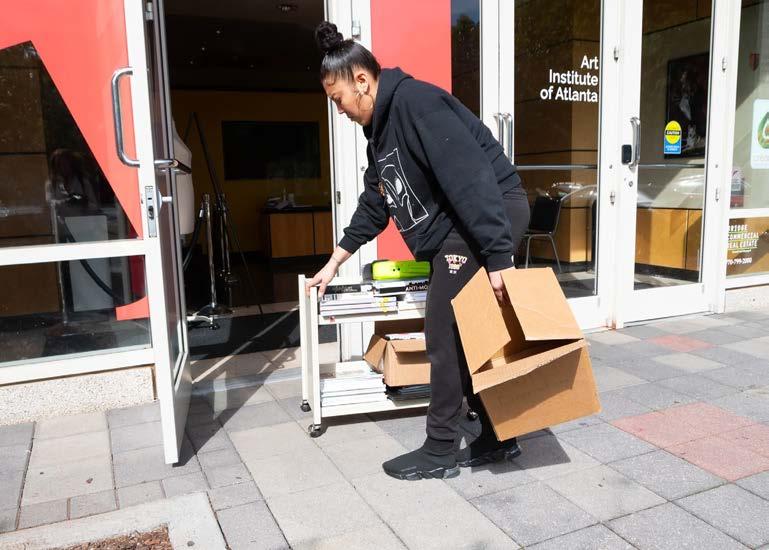
fashion designer.
“I’m pretty upset, I feel like somebody knocked the wind out of me,” said Joyce, 34. “If we were given the opportunity as students to know, we could have helped fix it. We could have tried to raise funds.”
Joyce, who used her veteran status to help pay for college, has to start looking for a new school, but she isn’t looking for a new goal. She plans to be a fashion designer. Nothing will change that, she says.
“I just have to look forward and go to another school,” she said. “It’s not going to stop anything.”
The school stated on its website that five official copies of each student’s transcript will be mailed to the college of their choice at no cost.
Are you a farmer, rancher, or forest landowner who has faced discrimination in USDA farm lending prior to January 2021?
You may be eligible for financial assistance through the U.S. Department of Agriculture’s (USDA) Discrimination Financial Assistance Program (DFAP).
What is DFAP?
$2.2 Billion in Financial Assistance:
Thanks to Section 22007 of the Inflation Reduction Act, USDA is allocating $2.2 billion in financial assistance to eligible farmers, ranchers, and forest landowners who experienced discrimination in USDA farm lending programs.
Eligibility: Farmers, ranchers, and forest landowners who experienced discrimination by USDA in its farm loan programs prior to January 1, 2021, and/or are currently debtors with assigned or assumed USDA farm

loan debt that was the subject of USDA discrimination that occurred prior to January 1, 2021, are eligible for this program.
Multiple Ways to Apply: Producers have the option to apply via the e-filing portal at 22007apply.gov or by submitting paper-based forms via mail or in-person delivery to the program’s local offices.
Free Technical Assistance: Technical assistance is available for potential applicants through four regional hubs working closely with community-based organizations.
Local Resources: Local brick-and-mortar offices are being opened across the country to ensure easy access and personalized assistance. In-person and virtual events are also being held weekly, with state-by-state information on the website.
Important Deadline: Don't miss out! The deadline for eligible farmers, ranchers, or
forest landowners to complete their application is January 13, 2024.
Learn More:
Website: For detailed information about
DFAP, please visit our official website at 22007apply.gov. Our website provides comprehensive information on obtaining in-person or virtual technical assistance, supplementary program resources, and detailed program guidelines.
Call Center: Our call center, available at 1-800-721-0970, operates from 8 a.m. ET to 8 p.m. PT, seven days a week, except for Federal holidays. English- and Spanish-speaking agents are available, ensuring you get the assistance you need, when you need it.
Newsletter: Information about the program, resources, recent office openings, and local events across the country is also available through a weekly e-newsletter, which you can sign up for on the program site.
DFAP is all about giving you the support you deserve. Don't let this opportunity pass you by! Apply now to secure this financial assistance.
Read full article online at www.theatlantavoice.com

Atrait that many Black people have in common is resilience. Part of the reason why is that most people of color are combating racism in its many forms on a daily basis. Whether it’s dealing with systemic racism or the microaggressions that occur in the workplace. Some Black people are reaching their limits. This leads to exhaustion or what can also be known as “Black Fatigue”.
Black Fatigue levels have been reported on by the American Heart Association. Experts weigh in on how this subject is taking a toll on Black community and why we should not underestimate it.
“You should take Black Fatigue seriously, because it’s killing people. It’s killing their mind, body and spirit. We are misdiagnosed, in terms of some of the mental stresses and oftentimes told that our pain is not as great ” said Mary Frances Winters, CEO and founder of the Winters Group Incorporated.
Black Fatigue is the exhaustion from small acts of aggression and disrespect Black people endure on a daily basis. Other stressors that lead to Black Fatigue are the endless need to prove one’s worth and constant exposure to news about injustice and violence being inflicted on people of color. Winters describes the feeling of Black Fatigue as “a
dull droning sound that is always present”. Winters is an expert in Diversity Equity and Inclusion. She released a book called Black Fatigue: How Racism Erodes the Mind Body and Spirit in 2020. The book explores this subject more and reveals why this problem has been perpetuated.
“I was going into organizations to do training, and strategy sessions about diversity, equity and inclusion. Younger Black people would approach me and say that they’re exhausted and tired of having to deal with the microaggressions in the workplace. I was like, “You’re 25 years old, how are you tired already?” They gave me a look, but with respect, they responded “Hey I know but I’m
tired.” If these young people in the workplace are fatigued, at 25, 30 years old, that means this is an intergenerational problem that has been perpetuated over and over,” said Winters.
One symptom of Black Fatigue is high levels of stress. Too much stress can play a role in heart disease and diabetes among other ailments. Black Fatigue also taps into one’s feelings of inadequacy. According to the report, psychotherapist Aishia Grevenberg says Black Fatigue will have one internalizing the stereotype of deficiency. Many Black professionals feel the pressure to prove they are worthy. Grevenberg and her clients were raised with the narrative they’d have to be twice as good to be considered half as good.

The Center of Disease Control (CDC) recognized that racism is a threat to public health. The American Heart Association has another report from 2020 that discusses how structural racism-based stress can lead to long-lasting damage to the body and brain. Winters believes medical schools and institutions need to highlight the relationship between racism and our health outcomes. A recent moment of Black Fatigue Winters felt was her discomfort of going to the store after the Dollar General shooting in Jacksonville, Florida.
“I think we sometimes as people don’t even recognize the relationship between
racism and our physical, mental and spiritual well-being. I was in a dollar general store thinking in the back of my mind “wow three people were killed at a dollar general store last week just because they were Black.” That is extra unnecessary stress just for going outside,” said Winters.
Black Fatigue is a complex issue with no simple solution. Winters says solving the Black Fatigue problem involves changing the whole system. Steps one can apply is to know your triggers. Winters set boundaries for herself by not watching anything about racism because she needs a reprieve from the race related work she does every day. Winters encourages finding your triggers and walking away from them with no guilt. Grevenberg recommends rest and giving yourself permission to back away from the pursuit of perfection.
“Rest is a protest. It’s revolutionary and it’s a sign that says I am human. I tell every single person I work with, ‘Have a snack and take a nap,’ Grebenberg says in the report.
For those who want to be an ally against this issue. Listening to your colleagues of color is a great step. Grevenberg explains in the report that being an ally is about providing a safe presence, someone who can validate experiences. She further explains Being present while listening and asking questions for understanding.
(Decatur) - Authors Tomiko Brown - Nagin and Linda Villarosa are this year’s winners of the annual Lillian Smith Book Awards held by the Southern Regional Council. BrownNagin’s book “Civil Rights Queen: Constance Baker Motley and the Struggle for Equality” and Villarosa’s book “Under the Skin: The Hidden Toll of Racism on Health in America” were selected out of 80 submissions
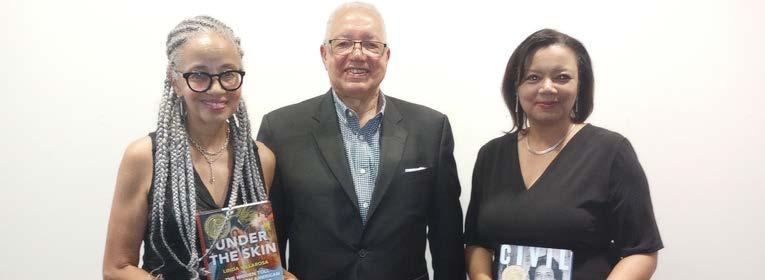
When it comes to civil rights legends, the name of Constance Baker Motley is either mentioned in passing or not at all. Motley played a pivotal role in the fight for civil rights. Motley was the only female lawyer at the NAACP Legal Defense Fund for 20 years where she worked with “Mr. Civil Rights” Thurgood Marshall before she was appointed by President Johnson as the first black woman to a federal bench in 1966. She re -
tired from the bench in 1986.
During her time with the LDF, she wrote the original complaint in Brown v. Board of Education and pioneered the legal campaigns for several seminal school desegregation cases. She was the first Black woman to argue before the Supreme Court and went on to win nine out of ten cases.
Villarosa is an award-winning journalist who has written about health and medical issues for decades. Her work includes articles for the New York Times magazine, Science Times and as an executive editor at Essence magazine. She is also the author of several books. Her first novel, Passing for Black was nominated for a Lambda Literary Award.
The Lillian Smith Awards were established after the acclaimed author passed in 1966. Her most famous piece of literature is her book, “Strange Fruit” (1944). Smith was one
of the most liberal and outspoken of white, mid-20th century Southern writers on issues of social and racial injustice years before the start of the civil rights movement.
In 2004, the Southern Regional Council en-
tered into a partnership with the University of Georgia Libraries to administer the award in partnership with the Dekalb County Public Library’s Georgia Center for the Book and Piedmont College’s Lillian E. Smith Center.
KIA continues to electrify with their 2023 Kia EV6 GT AWD. From its sleek design to aggressive engine rivaling the performance of virtually every crossover—both gas and all-electric—in the field, this automobile reflects the new era of cool in a big way. Reviewed in the attractive Runway Red bold, the exterior expresses confidence and demands attention. Sitting on massive 21inch alloy wheels with GT brakes and neon calipers, rear privacy glass and a spoiler, it looks custom built for the track. Under the hood packs a 77.4kWh lithium-ion battery paired with dual motors resulting in the muscle to go from 0-60 mph in 3.4 seconds. The EV6’s e-All Wheel Drive maneuverability further solidifies this carmaker is all about making every time behind the wheel unforgettable.
The black interior boasts synthetic suede bucket seats in the front that are sporty with neon piping to provide a hugging, race car
feel. The ambient lighting sets any mood the driver wishes for, and the cabin is embellished with the ideology that good things come in twos; a dual panoramic moonroof for optimal stargazing and dual panoramic 12.3-inch display with surround view deliver a high-tech cockpit unlike any other in the
market. The backseat gets some attention in the pampering department as well, with heating capability and dual-zone climate control. Addressing pleasure for the ears, all passengers will appreciate the 14-speaker premium Meridian sound system backed by a subwoofer for extra boom.
With all the looks and power comes responsibility, so KIA provides a long list of mind-easing collision-assist features thanks to their Drive Wise Driver-Assist Technology package, remote parking assist, and numerous airbags throughout the cabin protecting everything from ankles to the head. The EV6 GT‘s 79 combined MPGe (Miles Per Gallon Equivalent) is very reasonable considering all its power, with a driving range of 206 miles on a single charge. Continuing the KIA tradition, the 10-year/100,000-mile warranty provides a decade of reassurance.
Ultimately, the KIA EV6 GT is a candidate to win awards in various categories and should be strongly considered for anyone looking for an exhilarating driving experience while responsibly going electric for environmental preservation and riding seamlessly with flow of the auto industry’s future.

Fuel Economy: 85 MPGe city/ 74 highway/ 79 combined



Price: Base price is $61,400
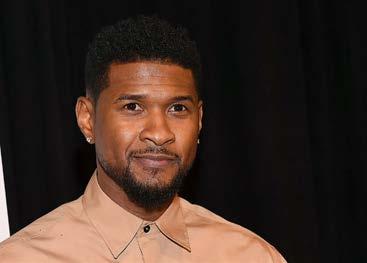




For more information, visit Kia.com.


